주메뉴
- About IBS 연구원소개
-
Research Centers
연구단소개
- Research Outcomes
- Mathematics
- Physics
- Center for Theoretical Physics of the Universe(Particle Theory and Cosmology Group)
- Center for Theoretical Physics of the Universe(Cosmology, Gravity and Astroparticle Physics Group)
- Center for Exotic Nuclear Studies
- Center for Artificial Low Dimensional Electronic Systems
- Center for Underground Physics
- Center for Axion and Precision Physics Research
- Center for Theoretical Physics of Complex Systems
- Center for Quantum Nanoscience
- Center for Van der Waals Quantum Solids
- Chemistry
- Life Sciences
- Earth Science
- Interdisciplinary
- Institutes
- Korea Virus Research Institute
- News Center 뉴스 센터
- Career 인재초빙
- Living in Korea IBS School-UST
- IBS School 윤리경영


주메뉴
- About IBS
-
Research Centers
- Research Outcomes
- Mathematics
- Physics
- Center for Theoretical Physics of the Universe(Particle Theory and Cosmology Group)
- Center for Theoretical Physics of the Universe(Cosmology, Gravity and Astroparticle Physics Group)
- Center for Exotic Nuclear Studies
- Center for Artificial Low Dimensional Electronic Systems
- Center for Underground Physics
- Center for Axion and Precision Physics Research
- Center for Theoretical Physics of Complex Systems
- Center for Quantum Nanoscience
- Center for Van der Waals Quantum Solids
- Chemistry
- Life Sciences
- Earth Science
- Interdisciplinary
- Institutes
- Korea Virus Research Institute
- News Center
- Career
- Living in Korea
- IBS School
News Center
| Title | IBS Center to host session on CRISPR Genome Editing in upcoming WCSJ | ||||||||||||||||||||||||
|---|---|---|---|---|---|---|---|---|---|---|---|---|---|---|---|---|---|---|---|---|---|---|---|---|---|
| Department | Department of Communications | Registration Date | 2015-06-08 | Hits | 3100 | ||||||||||||||||||||
| att. | |||||||||||||||||||||||||
|
IBS Center to host session on CRISPR Genome Editing in upcoming WCSJ The Center for Genome Editing will produce a session discussing key features and developments of CRISPR, featuring three keynote speakers
June 00, 2015
Jin-Soo Kim, director of the Center for Genome Editing at the Institute for Basic Science (IBS) will host a session titled “CRISPR Genome Editing in Medicine and Biotechnology” at the upcoming World Conference for Science Journalist (WCSJ) to be held in Seoul, South Korea at Coex from June 8 to 12. CRISPR (Clustered Regularly Interspaced Short Palindromic Repeat) genome editing technology has been successfully used to create genetically modified plants and animals including non-human primates. The technology could help to battle incurable diseases like cancer and AIDs. It works by targeting genetic modifications in cells and whole organisms using programmable nucleases that target and sever infected DNA in a sequence-specific manner. CRISPR-Cas9 is an offset of CRISPR and could be used a tool used to manipulate the DNA of plants, livestock and even humans. As this technology could potentially be revolutionary for mankind, it is not without controversy. Professor Xingxu Huang of Shanghai Tech University, who is one of the speakers in the session, is currently seeking permission from his institution’s ethics committee to try to genetically modify discarded human embryos. He previously modified embryos that developed into live monkeys. The Chinese scientist recently told Nature that the technique “gives lots of potential for its application in humans.” Conversely Professor Tetsuya Ishii, from Hokkaido University, has led various policy discussions on the regulations of genetically modified organisms (GMO) and human germline editing. Professor Ishii is an expert on science policy and is currently studying bioethics, focusing particularly on the relationship between society and biotechnology These two prominent experts will discuss progress and share their insights into the future direction of CRISPR technology. The session will take place on June 9 at 2 PM as one of the parallel sessions and will last for approximately 90 minutes. Each keynote will end with a Q&A, enabling participants to take the discussion further.
Notes for editors - Director Jin-soo Kim Director Kim is the co-founder of ToolGen Inc., a Korean biotechnology company established in 1999. He published the paper on CRISPR-Cas9 in Nature Biotechnology in 2013, drawing the attention of international science community.
On March 2014, he established the Center for Genome Editing at IBS, a key research institute in the International Science and Business Belt (ISBB) in South Korea.
- World Conference for Science Journalists The World Conference of Science Journalists (WCSJ) is one of the biggest global events in science journalism, and is a gathering of approximately 1200 journalists covering science and medical issues, as well as international experts.
WCSJ, which is marking its 9th conference in 2015, consists of a wide variety of programs that aim to expand the horizons of participants from different backgrounds through lively discussions. The conference will take place in COEX, Seoul, South Korea and run from June 8to 12. - For further information or to request media assistance, please contact: Mr. Shi Bo Shim, Head of Department of Communications, Institute for Basic Science (+82-42-878-8189; sibo@ibs.re.kr) or Ms. Sunny Kim, Department of Communications, Institute for Basic Science (+82-42-878-8135; Sunnykim@ibs.re.kr)
-
About the Institute for Basic Science
(IBS)
Session
Session Participants
|
|||||||||||||||||||||||||

















